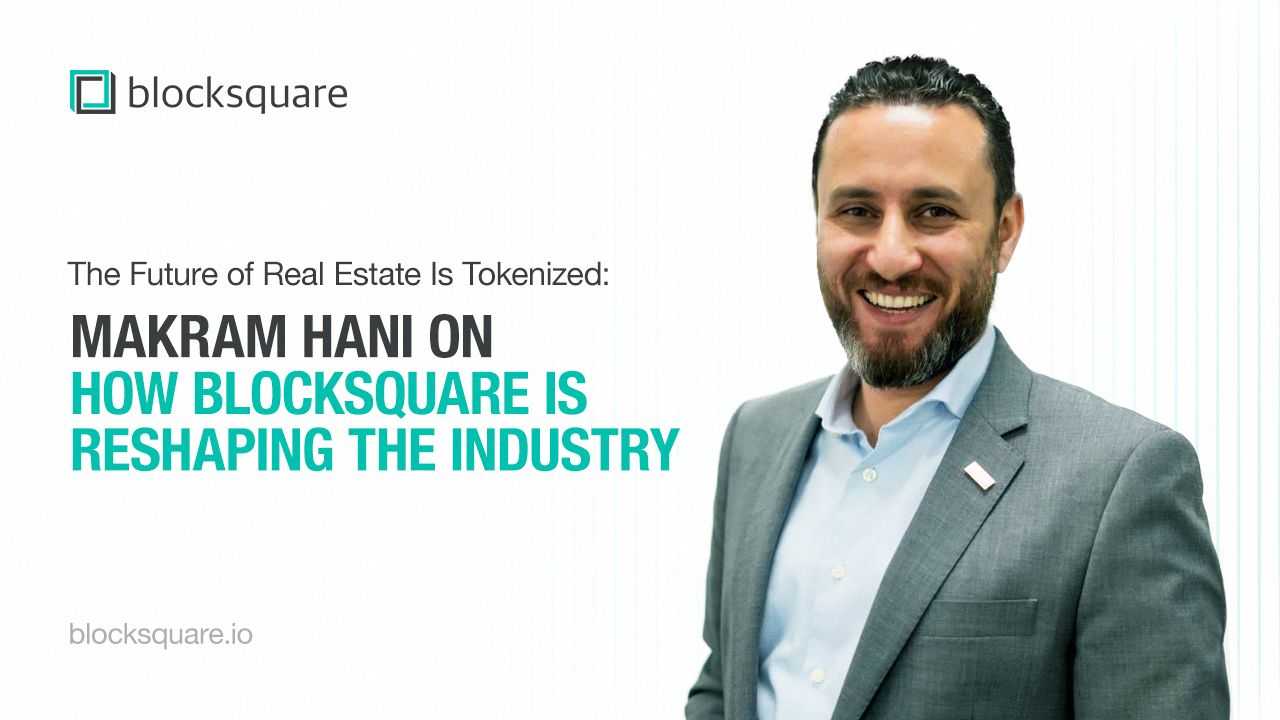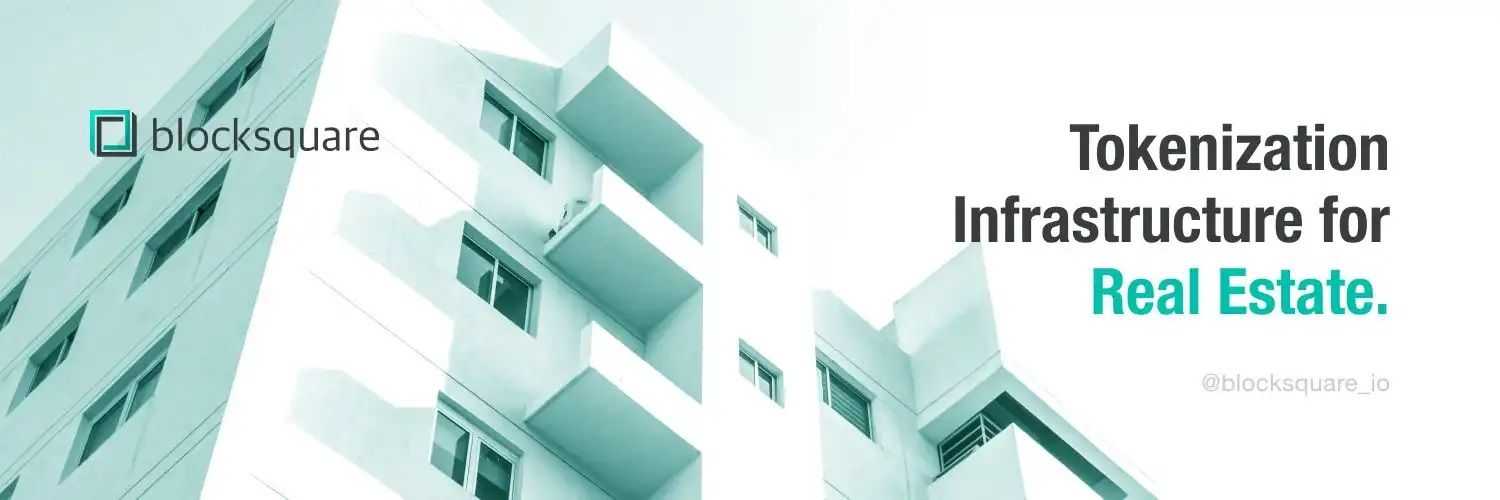The Future of Real Estate Is Tokenized: Makram Hani of Blocksquare Breaks Down What’s Next
In an industry where paperwork still rules and change moves slower than a zoning board meeting, tokenization isn’t just disruptive—it’s transformative. At Token2049 in Dubai, one of the world's leading blockchain gatherings, Makram Hani, COO of Blocksquare, sat down with Blockster’s Eric Spivak for a candid discussion about how blockchain is reengineering real estate. What followed wasn’t hype or hand-waving. It was a masterclass in how real estate, done right, can become borderless, efficient, and accessible—all without rewriting the laws of property, just the systems behind them.


Why Real Estate Needed a Shakeup
Makram Hani speaks from experience. He’s a real estate veteran, not a technologist. “I’m not a tech guy—I’m a real estate guy,” he told Spivak. But that’s precisely what makes him a credible bridge between the old world and the new. While Hani grounds the vision in deep real estate expertise, the rest of the Blocksquare team brings the blockchain backbone needed to execute it.
For decades, real estate investment has been defined by high entry barriers. You needed serious capital, trusted lawyers, lengthy due diligence, and a lot of patience. Want to buy a piece of property in another country? Good luck navigating cross-border regulations, language barriers, and opaque legal systems.
Tokenization flips the model.
By breaking down a property into blockchain-based tokens—each one directly tied to legal ownership documents—Blocksquare is making real estate as tradeable as stocks. More importantly, they’ve figured out how to do it legally and transparently, starting in Europe, where they pioneered the first notarized real estate tokenization deal.
Three Years to the First Breakthrough
Tokenizing real estate isn’t just a technical challenge—it’s a regulatory and legal one. Blocksquare spent three years working to marry traditional real estate processes with smart contract infrastructure. They weren’t chasing headlines. They were doing the hard legal and technical integration that makes tokenization not just possible, but enforceable.
And when they cracked it, they didn’t gatekeep it. They open-sourced the methodology, making it available for others to adopt and iterate on.
But don’t confuse open-source with simplistic. Their system anchors each token to real-world property deeds and land registry records. It’s not theoretical ownership—it’s legally recognized and enforceable.
The Token Is the Tip of the Iceberg
Tokenization is just one layer. Underneath that lies a blockchain ledger that records every phase of a building’s life—procurement, development, land acquisition, and ongoing operations. That kind of transparency isn’t just nice to have. It’s the foundation for trustless transactions.
“You don’t need to trust someone when the ledger tells you the whole story,” Hani explained. Every repair, every valuation, every ownership change becomes a line item in an immutable digital history.
This is what the industry has been missing: a single source of truth that can’t be altered, manipulated, or hidden behind red tape.
Why Dubai Is a Blueprint for the World
If you’re wondering where the future is being built, look to Dubai. According to Hani, by summer 2025, the UAE may become the first jurisdiction to fully tokenize land titles at the government level. Not just property tokens floating in the market—but titles that are officially recognized by the land department, stored immutably on-chain.
That removes entire layers of inefficiency and middlemen. It also redefines what ownership means in a digital-first global economy.
And while Blocksquare isn’t the regulator, it’s their infrastructure and vision that helped make this next step possible. It’s the culmination of years of groundwork—building systems that regulators can trust and institutions can adopt.
Lowering the Barrier to Entry for Everyone
Real estate isn’t just an asset—it’s shelter, security, pride, and legacy. That’s why the stakes are so high. Inaccessible ownership contributes to wealth inequality. People are priced out of markets before they even get started.
Tokenization flips that script.
“You’re 22. You’re a student. You can’t buy a house yet. But what if you could start owning part of one?” Hani asks.
Instead of scraping for years to build a down payment—only to find the price has already jumped—young people could start buying into property early, building equity gradually and sensibly. They don’t need to overleverage with a risky mortgage. They invest what they can afford, when they can afford it.
That’s dollar-cost averaging applied to real estate—just like you might spread investments across your savings, pension, or long-term planning strategies. It’s disciplined, accessible, and financially smart. And it opens the door to homeownership without overwhelming debt.
From Closed Funnels to Open Systems
Traditional real estate investment funnels are notoriously inefficient. By the time capital flows in and out, middlemen have extracted a significant percentage in fees, leaving retail investors with limited upside.
Tokenization fixes this.
No more opaque structures. No more hidden costs. On-chain records show valuations, transfers, and transaction history. Tools like Blocksquare’s Tokelytics platform let anyone track, analyze, and evaluate tokenized properties, even if they’re not part of the Blocksquare ecosystem.
This open-data ethos matters. It enables investor education. It encourages competition. And it raises the standard across the board.
But What About the Next Boom?
Spivak asked the million-dollar question: is this the next boom in real estate?
Hani didn’t flinch. “It has to be,” he said. Not because tokenization is trendy, but because the current system is unsustainable. Real estate can't remain a black box of paperwork, intermediaries, and friction. The demand for transparency, accessibility, and liquidity is only growing—and tokenization delivers on all three.
The technology is here. The legal precedents exist. What’s left is mass adoption—and that will come not by turning every buyer into a blockchain expert, but by simplifying the front-end experience.
As Hani put it: “People don’t care how you tokenize. They care that they can see the asset, verify it, and buy it instantly. That’s what Amazon did. They didn’t sell logistics. They sold convenience.”
Trustless Doesn’t Mean Untrustworthy
“The future is trustless,” Hani said toward the end of the conversation. And in blockchain terms, that’s a feature, not a flaw.
It doesn’t mean you don’t trust people. It means you don’t have to.
The system itself—when built correctly—removes the need for blind trust. Everything is recorded. Everything is transparent. Everything is verifiable. That’s not just a new paradigm for real estate. It’s a new standard.
Final Word: We’re Not Reinventing Real Estate—We’re Fixing How It Works
Makram Hani doesn’t want to throw out the past. He wants to evolve it.
“Real estate is still real estate,” he says. “But how it’s accessed, managed, and owned—that’s what needs to change.”
Blocksquare isn’t chasing hype. They’re building infrastructure. They’re giving people real ownership, not promises. And they’re laying the groundwork for a world where owning part of a property is as easy, secure, and fast as buying Bitcoin.
It’s not the future of real estate.
It’s real estate, upgraded.
